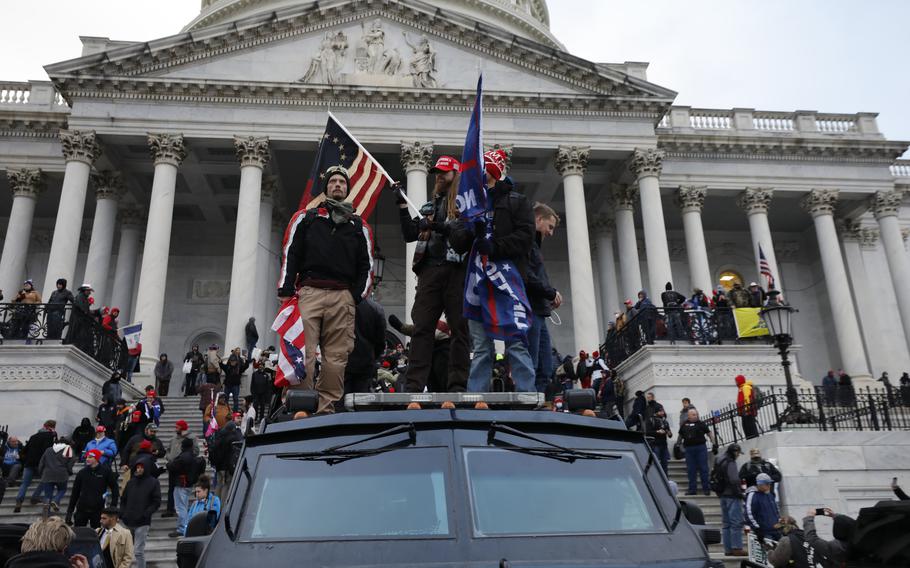
Supporters of then-President Donald Trump riot at the U.S. Capitol in Washington, D.C., on Jan. 6, 2021. (Yuri Gripas, Abaca Press/TNS)
A history of service in the U.S. military is the most common attribute among Americans who attempted or carried out acts of mass violence in the country in the last 30 years, according to a study published Thursday.
Researchers with the National Consortium for the Study of Terrorism and Responses to Terrorism, or START, found military affiliation as the most prominent characteristic among thousands of suspects in foiled and successful extremist plots to injure or kill at least four people. Military veterans were more likely to succeed in their plots, though the vast majority of such schemes — more than 70% — were thwarted by law enforcement before anyone was harmed, according to the study, which was led by the University of Maryland.
“A record of military service is more reliable for classifying mass casualty offenders … than factors that are more commonly discussed in the literature on mass casualty crimes, such as mental health concerns, offending alone or in a small group, and having a pre-radicalization criminal history,” the researchers wrote in the study that looked at thousands of cases of extremism-inspired mass casualty attacks and plots from 1990 to 2022.
Extremists with military backgrounds were 2.41 times more likely to be classified as mass casualty offenders than those who never served, the researchers found. For comparison, those with mental health concerns, the second highest indicator the study found, were 1.5 times more likely to attempt mass casualty attacks.
The study comes as the Pentagon wrestles with how to handle extremism within its ranks.
Defense Secretary Lloyd Austin has made the issue a priority within the Defense Department, including efforts to train troops to recognize and report indications of extremism among their fellow service members.
The Pentagon's focus on extremism came largely in the wake of the Jan. 6, 2021, attack on the U.S. Capitol by supporters of then-President Donald Trump. The attack included a handful of service members and dozens of veterans among the hundreds in the mob that sought to stop Congress from certifying President Joe Biden's election victory. Nonetheless, several Republican lawmakers have pushed back on the Pentagon efforts to address extremism, labeling them overtly political or unnecessary.
Pentagon officials have said they know extremist groups, especially far right and anti-government organizations, seek out military veterans and push their young followers to enlist so they can receive military training.
The study found the vast majority of military-affiliated mass casualty plotters were aligned with far-right domestic extremist groups such as anti-government militia groups and white supremacist organizations. Those groups included the anti-government Boogaloo movement, the Oath Keepers, Ku Klux Klan and the neo-Nazi Atomwaffen Division.
Islamist extremists made up the next highest category with about 15% of military-affiliated offenders, with those pledging support for groups including al-Qaida and the Islamic State.
The study also found those who plotted mass casualty attacks after leaving the military typically did so long after separating from the service. More than 65% of military-affiliated individuals who plotted mass casualty attacks did so six or more years after leaving the service and about half of those did so more than 16 years after separating.
About 22% of military-affiliated mass casualty attack planners were on active-duty or serving in the National Guard or Reserve when they plotted or carried out attacks, the researchers found.
While the START researchers found Americans with a military background are no more likely to be radicalized than civilians, those who have served and were radicalized “are more likely to plan for, or commit, mass casualty crimes, thus having an outsized impact on public safety.”
The START researchers encouraged better instruction on extremism for the military, writing the Pentagon should educate troops entering the military as part of its curriculum and troops leaving the service through its Transition Assistance Program.
The group also recommended the Pentagon work with elected officials, the Department of Veterans Affairs and veterans services organizations “to implement a public health informed strategy to address extremism in the ranks.”